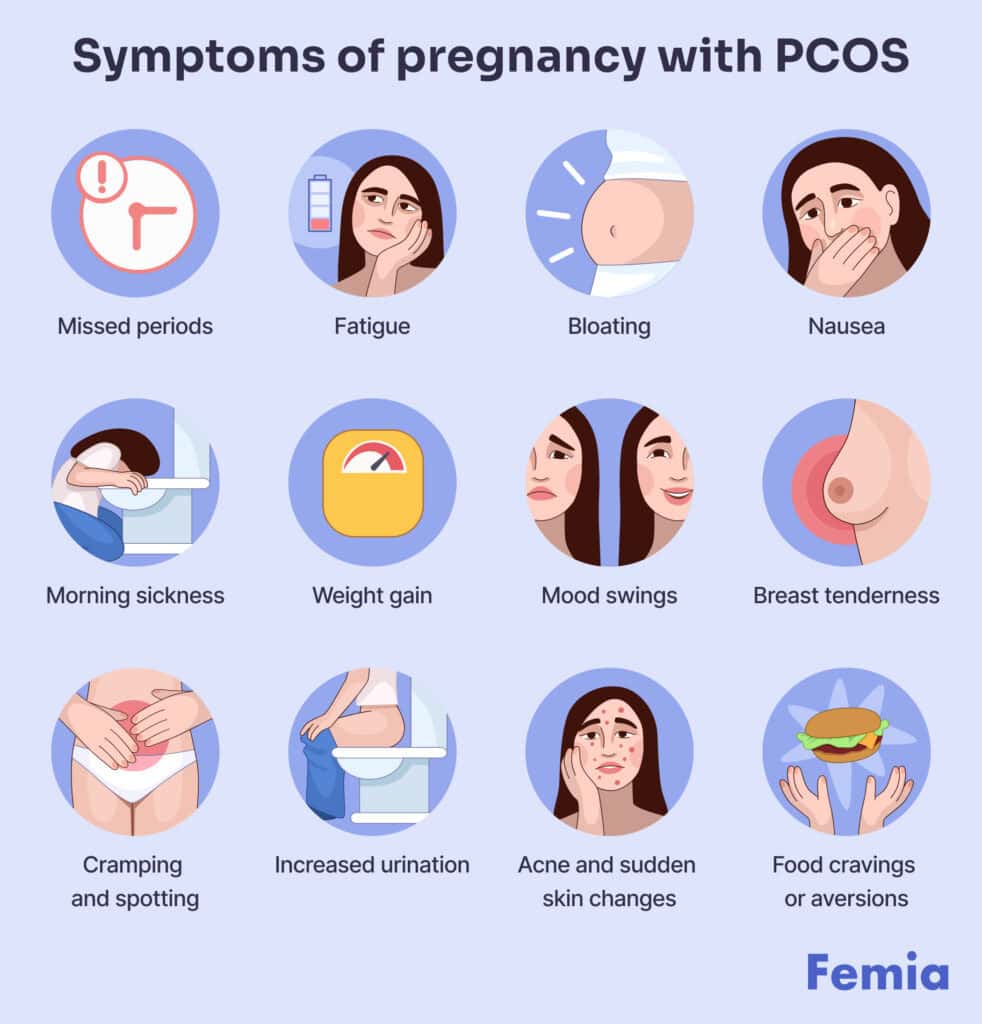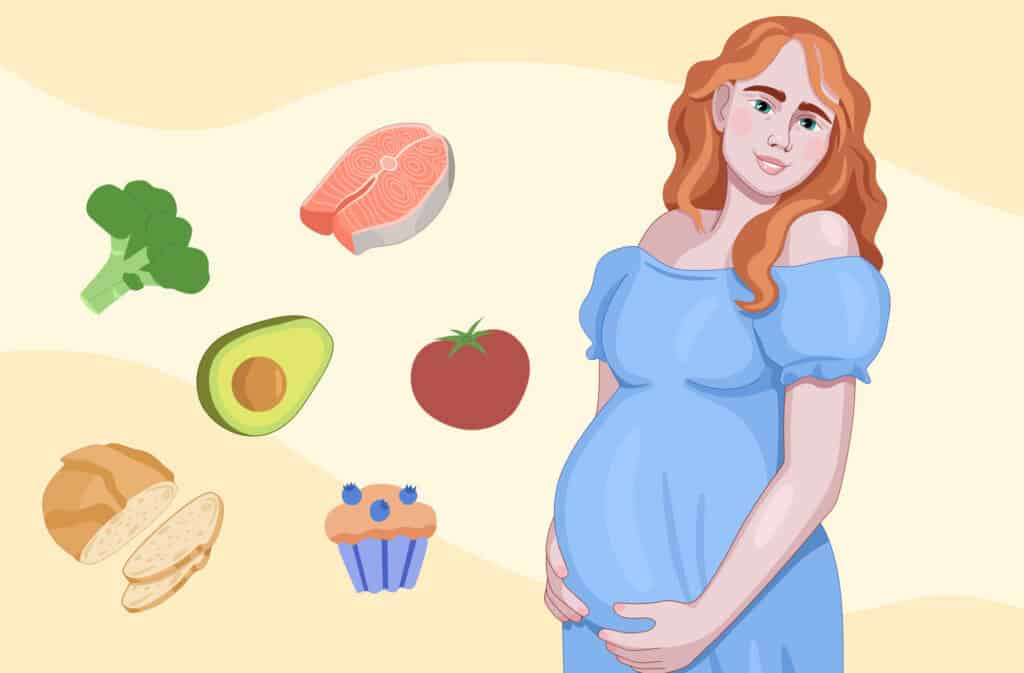Femia > Health Library > Getting Pregnant > Challenges > PCOS pregnancy symptoms: How to recognize the signs
PCOS pregnancy symptoms: How to recognize the signs

- Updated Feb 10, 2025
- Published
CRAFTED BY HUMAN
Crafted by human At Femia, we provide accurate and up-to-date information at every stage of your journey, from trying to conceive, pregnancy and postnatal support. All content is created by a real person based on in-depth research and own professional experience. Femia ensures that you will receive expert advice, strict accuracy and a personalized approach from our authors/medical experts. Learn more about our editorial policy.
FACT CHECKED
Fact checked At Femia Health, we maintain the highest standards of editorial excellence in delivering content focused on helping you conceive, guiding you through pregnancy, and supporting you postpartum. Explore our content review principles to learn how we ensure the accuracy and quality of our health and lifestyle tips for every stage of your journey.
Polycystic ovary syndrome (PCOS), a hormone disorder, may include symptoms such as irregular periods, extra body hair, and abdominal weight gain. Some of these symptoms are similar to what a pregnant women experience during the first trimester, so it may be more difficult to notice symptoms of pregnancy with PCOS. If you notice any changes, it’s best to take a pregnancy test and seek medical evaluation.
As a woman struggling with PCOS, you may experience symptoms like irregular periods, weight gain (particularly around your belly), mood changes, and fatigue. But, while these are common symptoms of PCOS, they can also be signs of early pregnancy.
With similar traits, it could be harder for women to recognize pregnancy symptoms with PCOS. Even more complicated, having irregular periods may lead women with PCOS to misjudge their fertility timeline and take a pregnancy test too early, leading to a false negative, because the body needs more time to produce enough human chorionic gonadotropin (hCG) hormone.
Never fear. This article will help you learn more about pregnancy symptoms with PCOS, how you can recognize them, and how they differ from regular PCOS symptoms.
Femia offers the most accurate tool for determining ovulation and fertile days
Symptoms of pregnancy with PCOS

It can sometimes be hard to detect pregnancy with PCOS because of the hormonal imbalances that this syndrome causes.
Women diagnosed with PCOS often experience irregular menstrual cycles, changing hormone levels, and other symptoms that sometimes mask or mimic typical pregnancy signs.
Let’s explore some specific symptoms of pregnancy with PCOS:
1. Missed periods
A missed period is one of the main and first signs of pregnancy that can’t be missed. However, women with PCOS may experience irregular or missed periods even without pregnancy, so this symptom may not immediately signal pregnancy.
2. Fatigue
Pregnant women often feel extreme tiredness due to hormonal changes. However, chronic fatigue is also a common sign of PCOS due to insulin resistance or hormonal imbalance, as well.
That’s why it could be tricky to distinguish PCOS pregnancy symptoms like fatigue from regular PCOS side effects. In addition, chronic fatigue without any other pregnancy or PCOS signs may signify other health conditions, so it’s essential to consult a healthcare provider if you start experiencing this symptom suddenly.
3. Breast tenderness
Hormonal changes often cause breast swelling and tenderness in early pregnancy. However, breast tenderness might be less noticeable for women with PCOS, as hormonal fluctuations can already cause breast discomfort or swelling, confusing women between pregnancy symptoms with PCOS.
4. Nausea and morning sickness
Nausea, with or without vomiting, is a pretty common early symptom of pregnancy. However, some women struggling with PCOS while pregnant may experience less severe nausea because of existing hormone imbalances. In some cases, gastrointestinal issues associated with insulin resistance may also obscure this symptom.
5. Weight gain
Gradual weight gain is a natural process during pregnancy because of the growing baby and changes in metabolism.
This can be one of the more prominent symptoms of pregnancy with PCOS because of insulin resistance and hormonal imbalances. In most cases, fat is concentrated around the belly. However, since abdominal weight gain can also be a symptom of PCOS in general, keep an eye on other pregnancy symptoms to identify the cause. Women with PCOS are also advised to closely monitor their weight and diet, as excess weight can increase the risk of complications during pregnancy.
6. Increased urination
Increased urination often follows early pregnancy signs like the first missed period and fatigue. happens because the uterus expands, and hormones affect kidney function.
Some women struggling with PCOS may also experience frequent urination due to insulin resistance or related metabolic issues, so it’s best to consult a healthcare provider to verify the cause, especially when it is the only symptom.
7. Mood swings
Hormonal changes during pregnancy often cause mood changes, particularly increased emotional sensitivity and irritability.
PCOS may not affect sudden mood changes as much as a progressing pregnancy, but some women may experience depression due to fluctuating hormone levels.
8. Cramping and spotting
Light cramping and spotting can occur as a fertilized egg implants in the uterus (implantation bleeding). On the other hand, PCOS often comes with irregular periods, and hormonal imbalances may cause occasional cramping and spotting, making it difficult to tell if such symptoms are pregnancy-related.
9. Bloating
Bloating often happens during pregnancy, because your body starts producing more progesterone, which slows digestion.
Women with PCOS often experience bloating due to hormonal fluctuations, so early pregnancy bloating might feel similar to the regular, PCOS-related kind.
10. Acne and sudden skin changes
It is a popular symptom for pregnancy to make skin even clearer because of hormonal changes. However, it still may cause skin to worsen, causing acne and unexpected changes.
Many women with PCOS suffer from acne or oily skin due to elevated androgens, so any pregnancy-related skin changes may be less noticeable or harder to detect.
11. Food cravings or aversions
Many women experience strong food cravings or aversions due to pregnancy hormones. Insulin resistance and hormonal imbalances may also cause cravings, especially for carbohydrates, making it harder to discern if cravings are normal or part of pregnancy symptoms with PCOS.
👉Find out more: Best age to get pregnant with PCOS: When to start and what you need to know
Does PCOS affect hCG levels in early pregnancy?
HCG is known as the pregnancy hormone, as it is made by cells formed in the placenta to nourish the egg once it has been fertilized and attached to the uterine wall.
Pregnancy tests use the level of hCG hormone in your blood or urine to verify pregnancy. HCG levels can be detected using a blood test about 11 days after conception and about 12–14 days after conception using a urine test. In most cases, the hCG levels will double every 72 hours, with the highest level during the first 8–11 weeks of pregnancy. After this, the levels will slowly decline.
PCOS should not affect the results of a pregnancy test. However, false negative tests can happen and are usually caused by low levels of hCG. If the test is taken too early, there may not be a high enough concentration of the hormone to be identified yet.
Difference between PCOS and pregnancy symptoms
Let’s compare PCOS and first trimester pregnancy symptoms in detail:
| Symptom | PCOS | Pregnancy |
|---|---|---|
| Menstrual cycle | Irregular or absent periods (amenorrhea) | Missed period is one of the earliest signs |
| Ovulation | Irregular or absent ovulation (anovulation) | No ovulation during pregnancy |
| Weight Changes | Weight gain, difficulty losing weight, fat is mostly concentrated around the belly | Weight gain as pregnancy progresses |
| Acne and Skin Changes | Acne, oily skin due to hormonal imbalances | Some skin changes, including acne or darkening of skin (melasma), especially with skin changes being rare before pregnancy |
| Hair growth | Excessive hair growth (hirsutism) on face, body | Mild increase in hair growth, usually limited to the abdomen |
| Fatigue | Fatigue due to hormone imbalances | Common in early pregnancy due to hormonal changes |
| Nausea | Not a common symptom | Morning sickness (nausea, vomiting), especially in the first trimester, combined with fatigue |
| Breast tenderness | Possible, but not common | Common, especially in early pregnancy |
| Mood changes | Depression and moderate mood swings due to hormonal imbalance | Sudden mood swings due to hormone changes in early pregnancy |
| Pelvic pain | Possible due to ovarian cysts | Mild cramping or discomfort in early pregnancy |
| Cravings/aversions | Not typically associated with cravings | Common food cravings or aversions |
| Fertility | May struggle with infertility due to irregular ovulation | Fertility ceases during pregnancy |
| Vaginal discharge | May have unusual discharge due to hormonal imbalance | Increase in white, milky discharge (leukorrhea) |
Does PCOS affect pregnancy?
Whether or not you’re trying to conceive, knowing you have PCOS is crucial for your reproductive health. In addition to the many outwardly noticeable symptoms, including abdominal weight gain, hair growth, and missed periods, PCOS makes it harder to conceive. But, it is still possible.
This is due to the hormonal imbalance with PCOS, which makes some women ovulate irregularly or not at all. Because ovulation (when you release an egg) is an essential part of getting pregnant, this irregularity can make things tricky or take longer compared to those without PCOS.
Aside from that, women with PCOS often have insulin resistance, which can also increase the risk of type 2 diabetes, as well as gestational diabetes during pregnancy. Diabetes impacts your health and, if left undiagnosed, may also cause fertility problems.
In addition, according to the National Institute of Child Health and Human Development (NICHD), woman with PCOS also have an increased risk of developing the following conditions:
- Heart disease
- High blood pressure
- Inflammation
- Metabolic syndrome
- Mood disorders, like depression and anxiety
- Obesity
How do you ensure a healthy pregnancy with PCOS?
Ensuring a healthy pregnancy when you have PCOS first involves seeking medical advice. You can get pregnant with PCOS without medical intervention, but if you can’t conceive for over a year, it’s important to proactively seek help and explore treatment options.
Aside from monitoring your pregnancy with a healthcare provider, there are also some tips you can consider to ensure a safe pregnancy journey with PCOS.
Eat regularly and manage weight
Eating healthier makes all the difference for both the baby and your own health. Since it’s common for women with PCOS to gain weight while pregnant, it is important to manage a healthy diet.
It’s totally okay to eat more while pregnant than you usually would, but healthcare providers will still closely monitor how much weight you gain, as it can affect how the pregnancy goes.
Focus on eating foods rich in fiber, protein, iron, calcium, and healthy fats that will keep you and your baby as strong and healthy as possible. It’s essential to avoid smoking and drinking alcohol.
Protein-rich foods include:
- Beans,
- Legumes,
- Fish,
- Eggs;
- Meat (but avoid liver),
- Nuts.
Consider the following fiber-rich foods include:
- Whole grains,
- Avocados,
- Berries,
- Dried fruits,
- Apples.
When you reach for the snacks, opt for nutritious options such as:
- Salad vegetables, such as celery, cucumber, or carrot;
- Hummus with vegetable sticks;
- Fruit;
- Apricots, figs, or prunes.
👉Find out more: Fertility diet: What to eat to boost your chances of getting pregnant
Limit caffeine
It’s best to limit or avoid caffeine intake altogether when you are pregnant. Thigh caffeine intake during pregnancy has been linked to pregnancy complications. If you need a little pick-me-up because of pregnancy fatigue, the best thing you can do is practice moderate exercises, drink green tea (also moderate consumption), and eat a balanced, PCOS-friendly diet.
Include gentle physical activity
Regular, pregnancy-safe physical activity will have a positive effect on your blood glucose levels and reduce the risk of gestational diabetes. It’s best to have at least 30 minutes of moderate activity each day.
Enjoy a walk outside, yoga, stretching, or swimming—choose the activity that best suits your lifestyle and desires. An ideal exercise should raise your heart rate and make you breathe a little faster.
Femia offers the most accurate tool for determining ovulation and fertile days
Questions from the Femia community
Can I still experience pregnancy symptoms early if I have PCOS?
Yes, many women still notice early pregnancy signs and can differentiate them from PCOS. Some of the most notable ones are nausea and breast tenderness. It’s advisable to track pregnancy symptoms in an app to help identify any changes and guide you in taking a pregnancy test and seeking medical evaluation if necessary.
Does PCOS increase my chance of a false negative pregnancy test?
PCOS does not usually affect pregnancy test accuracy, but the hormonal imbalances that women with PCOS experience can sometimes cause confusion. False negative tests usually happen when the test is taken too early, as the hCG hormone level is still low.
How can I track my pregnancy symptoms if I have irregular periods due to PCOS?
Use pregnancy tests and track other pregnancy symptoms with PCOS like fatigue, nausea, or breast tenderness instead of relying solely on period timing.
The bottom line
It can be difficult to identify the difference between PCOS and pregnancy symptoms due to overlapping signs. It’s important to closely monitor your symptoms and consult a healthcare provider for proper diagnosis and guidance. Early medical advice is crucial for managing PCOS during pregnancy to reduce complications and support a healthy pregnancy.
References
- Amiri, Mina, et al. “Risk of Hypertension in Women with Polycystic Ovary Syndrome: A Systematic Review, Meta-Analysis and Meta-Regression.” Reproductive Biology and Endocrinology, vol. 18, no. 1, 17 Mar. 2020, https://doi.org/10.1186/s12958-020-00576-1.
- Australia, Healthdirect. “Frequent Urination during Pregnancy.” Pregnancy Birth Baby, 18 June 2021, www.pregnancybirthbaby.org.au/frequent-urination-during-pregnancy#:~:text=Frequent%20urination%20is%20common%20at.
- Cleveland Clinic. “Human Chorionic Gonadotropin: Hormone, Purpose & Levels.” Cleveland Clinic, 2022, my.clevelandclinic.org/health/articles/22489-human-chorionic-gonadotropin.
- Giri, Amrita, et al. “Metabolic Syndrome among Patients with Polycystic Ovarian Syndrome Presenting to a Tertiary Care Hospital: A Descriptive Cross-Sectional Study.” Journal of Nepal Medical Association, vol. 60, no. 246, 15 Feb. 2022, pp. 137–141, https://doi.org/10.31729/jnma.7221.
- González, Frank. “Inflammation in Polycystic Ovary Syndrome: Underpinning of Insulin Resistance and Ovarian Dysfunction.” Steroids, vol. 77, no. 4, Mar. 2012, pp. 300–305, https://doi.org/10.1016/j.steroids.2011.12.003.
- hospitalkjk. “Breast Pain during Pregnancy: Causes & Remedies – KJK Hospital.” KJK, 23 Nov. 2023, kjkhospital.com/breast-pain-during-pregnancy-causes-and-remedies/.
- Jurczewska, Justyna, et al. “Abdominal Obesity in Women with Polycystic Ovary Syndrome and Its Relationship with Diet, Physical Activity and Insulin Resistance: A Pilot Study.” Nutrients, vol. 15, no. 16, 20 Aug. 2023, pp. 3652–3652, https://doi.org/10.3390/nu15163652.
- Liu, Kristina, and Janelle Nassim. “Polycystic Ovarian Syndrome and the Skin.” Harvard Health, 29 Apr. 2021, www.health.harvard.edu/blog/polycystic-ovarian-syndrome-and-the-skin-202104292552#:~:text=PCOS%2Drelated%20acne%20often%20flares.
- Mayo Clinic. “Polycystic Ovary Syndrome (PCOS) – Symptoms and Causes.” Mayo Clinic, 8 Sept. 2022, www.mayoclinic.org/diseases-conditions/pcos/symptoms-causes/syc-20353439.
- Mayo Clinic Staff. “Symptoms of Pregnancy: What Happens First.” Mayo Clinic, 3 Dec. 2021, www.mayoclinic.org/healthy-lifestyle/getting-pregnant/in-depth/symptoms-of-pregnancy/art-20043853.
- “Limiting Your Caffeine Intake in Pregnancy.” Tommy’s, www.tommys.org/pregnancy-information/calculators-tools-resources/check-your-caffeine-intake-pregnancy.
- NHS. “Stomach Pain in Pregnancy.” NHS, 3 Dec. 2020, www.nhs.uk/pregnancy/related-conditions/common-symptoms/stomach-pain/.
- NHS. “Weight Gain in Pregnancy.” NHS, 3 Dec. 2020, www.nhs.uk/pregnancy/related-conditions/common-symptoms/weight-gain/#:~:text=Weight%20gain%20in%20pregnancy%20varies.
- Paweł Dybciak, et al. “Depression in Polycystic Ovary Syndrome: A Systematic Review and Meta-Analysis.” Journal of Clinical Medicine, vol. 12, no. 20, 10 Oct. 2023, pp. 6446–6446, www.ncbi.nlm.nih.gov/pmc/articles/PMC10607337/, https://doi.org/10.3390/jcm12206446.
- Rizwan. “Mood Swings.” Veera Health, 16 Feb. 2023, veerahealth.com/symptoms/mood-swings//?utm_source=MoodSwings&utm_medium=Website&utm_campaign=Foundationalpage#:~
- Sam, Susan. “Obesity and Polycystic Ovary Syndrome.” Obesity Management, vol. 3, no. 2, Apr. 2007, pp. 69–73, www.ncbi.nlm.nih.gov/pmc/articles/PMC2861983/, https://doi.org/10.1089/obe.2007.0019.
- Stefanaki, Katerina, et al. “Food Cravings and Obesity in Women with Polycystic Ovary Syndrome: Pathophysiological and Therapeutic Considerations.” Nutrients, vol. 16, no. 7, 1 Jan. 2024, p. 1049, www.mdpi.com/2072-6643/16/7/1049, https://doi.org/10.3390/nu16071049.
- “Polycystic Ovary Syndrome (PCOS).” Johns Hopkins Medicine, 28 Feb. 2022, www.hopkinsmedicine.org/health/conditions-and-diseases/polycystic-ovary-syndrome-pcos#:~:text=Women%20with%20 PCOS%20 may%20not.
- “Polycystic Ovary Syndrome (PCOS): What Is It and What Are the Signs?” National Center for Health Research, 13 Oct. 2020, www.center4research.org/polycystic-ovary-syndrome-pcos-signs/.
- “Polycystic Ovarian Syndrome: How Your Ovaries Can Affect Your Heart.” Johns Hopkins Medicine, www.hopkinsmedicine.org/health/conditions-and-diseases/polycystic-ovarian-syndrome-how-your-ovaries-can-affect-your-heart#:~:text=PCOS%20risk%20factors%2C%20like%20being.
- Zhao, Han, et al. “Insulin Resistance in Polycystic Ovary Syndrome across Various Tissues: An Updated Review of Pathogenesis, Evaluation, and Treatment.” Journal of Ovarian Research, vol. 16, no. 1, 11 Jan. 2023, www.ncbi.nlm.nih.gov/pmc/articles/PMC9832677/pdf/13048_2022_Article_1091.pdf, https://doi.org/10.1186/s13048-022-01091-0.

Learn about the impact of nutrition on conception and pregnancy and explore a list of recommendations on foods to avoid.

Gilead’s lenacapavir demonstrates 100% efficacy and a strong safety profile, offering a promising new HIV prevention method with twice-yearly dosing.

Wondering why your period blood is black? Learn about common causes, when it’s normal, and when you should visit a trusted healthcare provider in our comprehensive guide to black period blood.

